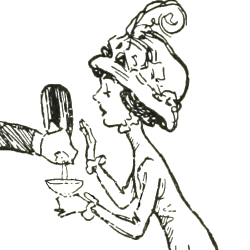 Can we even talk about qualia, the phenomenal parts of conscious experience? Whereof we cannot speak, thereof we must remain silent, as Wittgenstein advised, not lingering to resolve the paradoxical nature of the very phrase ‘whereof we cannot speak’ – it seems to do the very thing that it specifies cannot be done. We see what he meant, perhaps.
Can we even talk about qualia, the phenomenal parts of conscious experience? Whereof we cannot speak, thereof we must remain silent, as Wittgenstein advised, not lingering to resolve the paradoxical nature of the very phrase ‘whereof we cannot speak’ – it seems to do the very thing that it specifies cannot be done. We see what he meant, perhaps.
There is certainly a difficulty of principle in talking about qualia, to do with causality. Qualia have no causal effects – if they did, they would be an observable part of the world of physics, and it is part of their essential definition that they are outside, or over and above, the mere physical account. It follows, notoriously, that whatever we say or write about qualia cannot have been caused by them. At first glance this seems to demolish the whole discussion; no-one’s expressed belief in qualia can actually be the causal result of experiencing them.
But it is possible to talk sensibly of things that did not cause the talk. It takes a weirdly contorted argument to defend the idea that when I refer to Julius Caesar, the old Roman himself caused me to do it, but perhaps we can lash something together. It’s worse that I can talk of Nero and Zero the rollicking Romans, who existed only as heroes of a cartoon strip. If you’re still willing to grant them some causal role in physics, perhaps somehow through the material existence of the paper and ink in which they were realised, remember that I can even talk intelligibly about Baesar, who has no existence whatever, and in all likelihood was never spoken of before. He really cannot have caused me to write that last sentence.
So I would say that the absence of causal effects does not provide a knock-down reason why I cannot speak of qualia, though the fact that the other cases without causality involve entities that are fictions or delusions cannot be comfortable if I want my qualia to be real. It seems as if there must be a sort of pre-established harmony effect going on, so that my words remain truthful on the matter even though they are not causally determined by it, which feels, as technical metaphysicians say, kind of weird.
But apart from the difficulty of principle, it seems awfully difficult to speak of qualia in practice too. How can we verbally pick out a particular quale? With real things, we choose one or more of their most salient attributes; with imaginary entities, we just specify similar properties. But qualia have no individual attributes of their own; the only way to pick them out is by mentioning the objective sensation they accompany. So, we typically get a quale of red, or a red quale. This is pretty unsatisfactory, because it means many interesting questions are excluded from consideration. We cannot really ask whether every sensation has a quale; we cannot ask how many qualia there are, because our way of referring to them just has baked into it the assumption that they exactly match up with the objective sensations. If green, as a matter of fact, was the only colour with no qualia, the fact would be occluded from us by the only language we can use to discuss the matter.
All of this might seem enough to justify our concluding that talk of qualia adds nothing to talk of objective sensations, so that even if, by some uncovenanted harmony, our talk of qualia proves to be metaphysically true, it has absolutely no informative value, and might as well be abandoned. What remains is the unconquerable conviction that there is something there, or to use the little phrase on which so much metaphysical weight has been rested, ‘there is something it is like’ to, for example, see red.
Can this phrase be explicated into something clearer? The first problem is the ‘it’; are we actually speaking of anything there? To me it seems that the ‘it’ in ‘something it is like’ is as merely grammatical as the ‘it’ in ‘it is raining’, which does not cause us to entertain the idea that there is something ineffable and non-physical about precipitation. The second problem is the ‘like’ which suggests we are making a comparison while leaving it quite unclear what is being compared. Is seeing red meant to be like seeing another colour? Is seeing red phenomenally meant to be like seeing red objectively (whatever that would mean)? In fact we seem obliged to conclude that no actual comparison is being made. Suppose we assert of hang-gliding or our first taste of champagne ‘there’s nothing like it!’ Are we managing here to assert after all that these experiences are unaccompanied by qualia? Surely not. If anything we’re saying that the relevant qualia are exceptionally powerful.
In the end, doing my honest best, I think ‘there is something it is like to see red’ simply asserts that the experience of seeing red really exists. I’m fine with that, and there are genuine mysteries attached; but there still seems to be nothing more we can say about qualia as a result. Haven’t we all been a bit too accepting for a bit too long of ‘there Is something it is like’?
